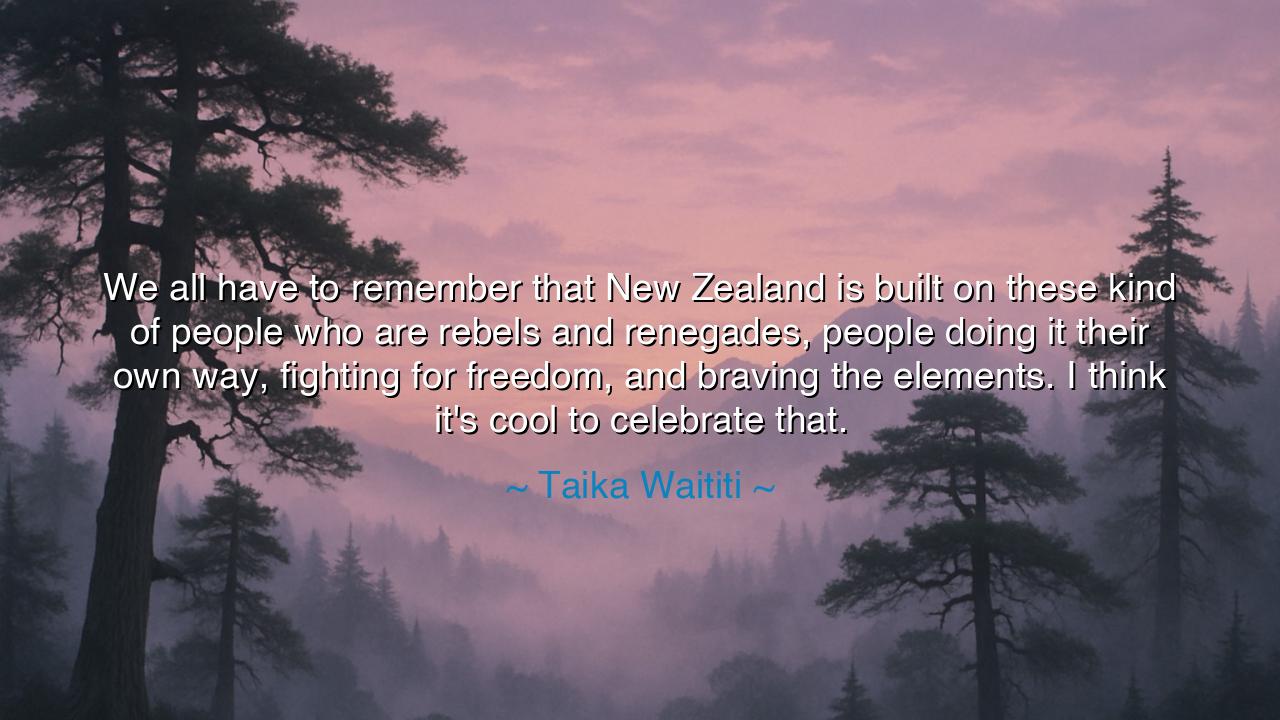
We all have to remember that New Zealand is built on these kind
We all have to remember that New Zealand is built on these kind of people who are rebels and renegades, people doing it their own way, fighting for freedom, and braving the elements. I think it's cool to celebrate that.






Taika Waititi's words, "We all have to remember that New Zealand is built on these kind of people who are rebels and renegades, people doing it their own way, fighting for freedom, and braving the elements. I think it's cool to celebrate that," carry a deep, resonant truth about the essence of courage, independence, and the spirit of rebellion that shapes the identity of not just a nation, but of humanity itself. In this declaration, Waititi calls attention to the foundational values that have carved New Zealand into its distinctive, proud shape: a history of resistance and self-determination, where those who dared to challenge the conventional paved the way for future generations. He speaks not just of a country, but of the very spirit that rises against adversity—an energy that is eternal, an energy that belongs to all of us.
This notion of rebellion as a source of strength and freedom is not unique to New Zealand, but is a thread that runs throughout history. The ancient Greeks held up figures like Achilles and Heracles, not merely as warriors, but as embodiments of defiance against the fates. They did not conform to the gods’ plans, but fought for their own destiny, carving their names into myth through acts of bravery and unconventionality. Achilles, with his refusal to bow to Agamemnon and his pursuit of glory in the face of certain death, exemplified the spirit of the renegade—someone who chose freedom over the prescribed path, who made a mark on the world through sheer willpower and the courage to be different.
The same spirit of resistance and self-determination lives on in the story of Joan of Arc, who, as a young peasant girl, led the French army against overwhelming odds. Her vision of freedom for her people was so strong that it compelled her to defy societal norms, face the elements of battle, and rise up in a way that was both radical and profoundly empowering. Joan was a rebel, a renegade, not because she sought conflict, but because she believed that the future of her nation depended on individual action, on one person standing up for what was right, no matter the cost. Like the people of New Zealand whom Waititi celebrates, Joan carved out her place in history by being brave, by defying the conventional, and by fighting for what she believed in.
New Zealand’s history itself is marked by these kinds of individuals—those who faced immense challenges, from the land’s natural elements to the forces of empire, and who chose to fight for their freedom and identity. The Maori people, who settled the islands and later fought to maintain their autonomy and culture against colonization, embody this spirit of rebellion. Their resilience, their fierce love for their land and people, became the foundation of a culture that would endure in the face of overwhelming odds. In their resistance, they became not just a symbol of survival, but of reclamation—of identity, of place, and of the unyielding will to shape one’s own destiny. Just as the renegades of New Zealand forged their own path, the Maori warriors' resistance was not just about survival—it was about celebrating their way of life in the face of a world that sought to take it from them.
In celebrating these rebels, Taika Waititi is calling us to remember that the path to freedom is often forged by those who refuse to conform. It is not those who follow the rules, but those who make their own rules, who shape the future. This is a theme that resonates throughout the ages: from Leonidas at the Battle of Thermopylae, to the American Revolutionaries who fought for independence, to the civil rights movements of the 20th century. Each of these moments, shaped by individuals who dared to be different, speaks to the profound impact of nonconformity in the face of tyranny, and to the unbreakable spirit of the renegade.
The lesson for us, then, is profound: if we wish to leave a mark on the world, we must not be afraid to be rebels—not for rebellion's sake, but for the sake of truth, freedom, and creativity. We are called not just to live passively, but to fight for what we believe in, to defy the elements and the expectations placed upon us, and to find our own path. We must celebrate the rebels in our own lives, those who dare to challenge the status quo and seek freedom on their own terms. In embracing the spirit of resistance, we honor the greatness of those who have gone before us and pave the way for those who will follow.
In practical terms, we must each find our own way to be rebels, whether it is in the work we do, the values we uphold, or the dreams we dare to chase. Let us celebrate those who refuse to conform, and let us be inspired by their example to build a life of purpose, freedom, and creativity. Just as New Zealand was built on the spirit of renegades, so too can we build a future founded on the ideals of those who choose to fight for what is right, even when the road is difficult, and the elements seem insurmountable.






AAdministratorAdministrator
Welcome, honored guests. Please leave a comment, we will respond soon